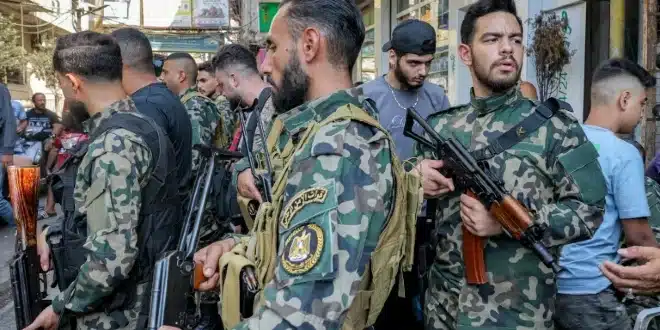U.S. envoy Tom Barrack praised Lebanon’s government and the Palestinian Fatah movement for beginning the process of disarming militant groups in refugee camps, calling it a landmark step toward peace and stability.
Speaking Thursday, Barrack congratulated both governments and Palestinian leadership for what he described as “a historic step toward unity and stability.” He credited the Lebanese Council of Ministers for taking “bold action” and hailed the voluntary disarmament agreement as proof of a “true commitment to peace and cooperation.”
The disarmament plan was first unveiled in May during Palestinian President Mahmoud Abbas’ visit to Beirut, where he and Lebanese President Joseph Aoun agreed that weapons inside Palestinian camps would be brought under Lebanese state authority.
Mixed Reactions Among Palestinian Factions
While Fatah has embraced the deal, not all Palestinian groups are on board. Hamas and Palestinian Islamic Jihad declined to comment directly, but Hamas circulated a statement signed by “the Palestinian Factions in Lebanon.” The declaration dismissed Thursday’s weapons handover as “an internal Fatah matter” unrelated to broader discussions about disarming Palestinian groups.
“Our weapons have always been, and will always remain, linked to the right of return and the just Palestinian cause,” the statement read, adding that arms would be maintained “as long as the occupation remains on Palestinian soil.”
This reflects longstanding divisions: while Abbas’ Fatah seeks closer coordination with Lebanon’s government, factions such as Hamas view their weapons as inseparable from resistance against Israel.
Weapons Handover Begins in Beirut and the South
The first transfer of arms took place Thursday at the Burj al-Barajneh camp on the outskirts of Beirut, according to Ramez Dimashkieh, head of Lebanon’s Palestinian Dialogue Committee. He said further handovers would follow “in the coming weeks” at Burj al-Barajneh and other camps.
Abbas’ spokesperson, Nabil Abu Rdeneh, confirmed that weapons were also surrendered at al-Bass camp in southern Lebanon as part of the agreement with Lebanese authorities.
Still, questions remain about the extent of compliance. Officials within the Palestinian factions suggested that only “illegal” or unregistered weapons might be handed over. They added that light personal arms would be excluded, with one Fatah representative noting that President Aoun himself acknowledged that personal weapons are “part of Arab and national culture.”
A Complex and Fragile Process
Lebanon is home to 12 Palestinian refugee camps, none of which are formally under government control. Armed clashes between rival groups in these camps have caused casualties in recent years and occasionally spilled into surrounding neighborhoods. Some factions have also launched rocket fire across the border into Israel, heightening tensions.
Roughly 500,000 Palestinians are registered with UNRWA in Lebanon, though the actual number living there is estimated closer to 200,000 due to emigration. Despite their large presence, Palestinian refugees face severe restrictions: they are barred from many professions, lack property rights, and live with limited legal protections.
Wider Implications for Lebanon
The handover of Palestinian weapons is widely seen as a preliminary move toward tackling the far more contentious issue of Hezbollah’s arsenal. Hezbollah, which fought a destructive war with Israel last year, continues to face both domestic and international pressure to disarm — pressure it has so far resisted.
While Thursday’s developments mark progress, analysts warn that deep divisions among Palestinian factions and Lebanon’s own fragile political balance could slow or undermine the process. For now, the symbolic first step may offer a glimpse of hope, even as the path forward remains fraught with challenges.


